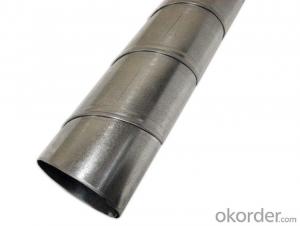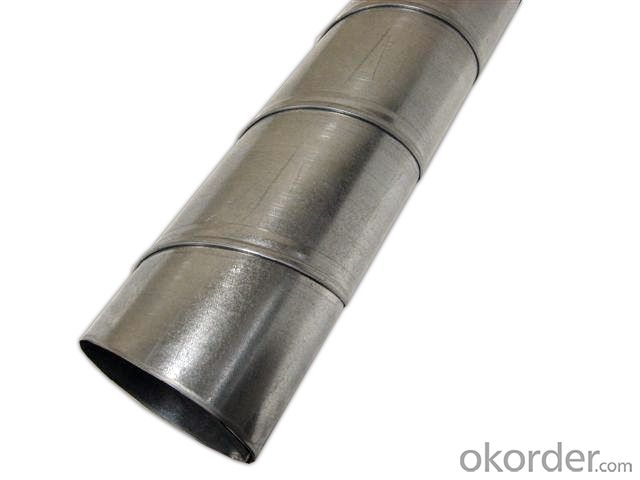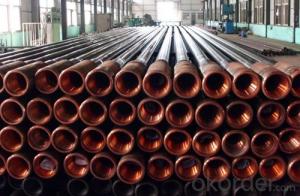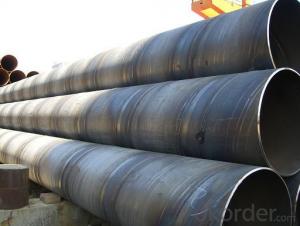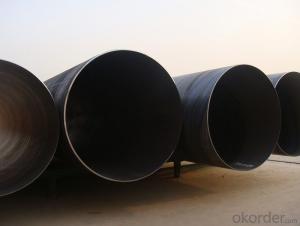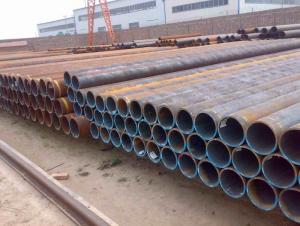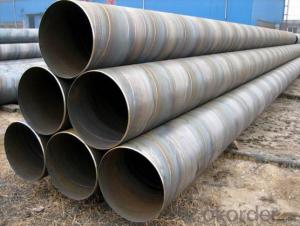SPIRAL WELDED STEEL PIPE 12‘’ 16‘’ 18‘’ 20’‘ CARBON
- Loading Port:
- Tianjin
- Payment Terms:
- TT OR LC
- Min Order Qty:
- 5 m.t
- Supply Capability:
- 3000 m.t/month
OKorder Service Pledge
OKorder Financial Service
You Might Also Like
Packaging & Delivery
Packaging Detail: | standard export packing or as customer's requirement |
Delivery Detail: | within 10 - 30 days |
Specifications
Spiral Welded Steel Pipes and Tubes
1.Material:Q195-Q235
2.Length:1-12m
3.WT:1.0-14mm
4.O.D.:20-273mm
Spiral Welded Steel Pipes and Tubes
Product Description:
1.Material : Q235,Q345,L245,L290,L360,L415,L450,L485,GrB,X42,46,X52,X56,X60,X65,X70,X80,X100
2,Standard: SY/T5037-2000,GB/T9711-2011,API Spec 5L PSL1/PSL2,ASTM A252\A53,ISO3183,DIN17172,EN10217,JIS G3457,AWWA C200,ASTM A139,ASTM A671,ASTM A672
3.Wall thickness: 3.0mm-30mm
4.Outer diameter: φ168mm-3020mm
5,Length: 5m-12m or as your requirement
6,Corrosion protection standard: DIN30670,DIN30671, AWWAC210, AWWA C203, SY/T0413-2002,SY/T0414-2002
7,Application: Oil, gas, natural gas, water pipe, thermal electricity pipe, steel structure engineering, etc
Q195-q345 Material Steel Pipe's Materials
Elements | Chemical Compsition% | Mechanical Property | ||||||
C% | Mn% | S% | P% | Si% | Yield Point (Mpa) | Tensile Strength(Mpa) | Elongation | |
Q195 | 0.06-0.12 | 0.25-0.50 | <0.050< span=""> | <0.045< span=""> | <0.030< span=""> | >195 | 315-430 | 32-33 |
Q215 | 0.09-0.15 | 0.25-0.55 | <0.05< span=""> | <0.045< span=""> | <0.030< span=""> | >215 | 335-450 | 26-31 |
Q235 | 0.12-0.20 | 0.30-0.70 | <0.045< span=""> | <0.045< span=""> | <0.030< span=""> | >235 | 375-500 | 24-26 |
Q345 | <0.20< span=""> | 1.0-1.6 | <0.040< span=""> | <0.040< span=""> | <0.55< span=""> | >345 | 470-630 | 21-22 |
Packaging & Delivery
Packaging Detail: | Normal exporting packing,in container or bulk vessel or as per clients' request |
Delivery Detail: | 2 months after confimed contract |
Specifications
Large Diameter API 5L X70 PSL2 LSAW Steel Pipe
Grade: X42, X46, X50, X52, X60, B, C
OD: 1.5"-28"
WT: SCH10-SCH160
Brand:TPCO
Large Diameter API 5L X70 PSL2 LSAW Steel Pipe
Specifications:
u Standard: API 5L
u Grade: B, C, X42, X46, X50, X52, X56, X60, X65, X70, X80
u OD: 1.5"-28"
u WT: SCH10-SCH160
u Length: 5-12m
u Ends Finish: plain end, bevel end, grooved end
u Surface Treatment: bare, black varnished, oiled finish, red color, anti-corrosion, 3PE, FBE or epoxy coating
u Technique: hot rolled or cold drawn
u Application: api 5l steel pipe for conveying oil, water, gas
u Invoicing: based on theoretical weight or actual weight
u Payment Terms: L/C at sight, T/T or Western Union
u Trade Terms: FOB, CFR, CIF
u Certification: ABS manufacturing assessment, ABS design assessment, API 5CT, API 5L, DNV manufacturer certificate, ISO9001 quality management system certificate, ISO14001 environment management system certificate, GB/T28001 occupational health and safety management system certificate, A1 class manufacturing license of special equipment certificate, CCS, GL, LR, SGS, TüV, PDE
- Q: Can steel pipes be used for conveyor systems?
- Yes, steel pipes can be used for conveyor systems. Steel pipes are known for their strength, durability, and resistance to wear and tear, making them suitable for handling heavy loads and continuous operation in conveyor systems. Additionally, steel pipes can be easily welded, allowing for customization and flexibility in conveyor designs.
- Q: Are steel pipes suitable for industrial cooling systems?
- Yes, steel pipes are generally suitable for industrial cooling systems. Steel is a strong and durable material that can withstand high pressure and temperature fluctuations commonly found in cooling systems. It has excellent resistance to corrosion, making it ideal for use with water or other coolants. Additionally, steel pipes have good thermal conductivity, allowing for efficient heat transfer in the cooling process. They are also readily available and cost-effective, making them a popular choice in industrial applications.
- Q: How are steel pipes threaded?
- Threading, a process that involves creating screw-like grooves on the outer surface of steel pipes, enables their connection to other pipes or fittings using threaded connections. Steel pipes can be threaded through various methods, including manual threading, electric threading machines, and hydraulic threading machines. Manual threading employs a handheld pipe threading tool called a die. The die is positioned on the outside of the pipe, and while pressure is applied, the pipe is rotated to generate the threads. This technique is suitable for smaller diameter pipes and is commonly used for on-site repairs or in smaller operations. For larger diameter pipes, electric threading machines are commonly used. These machines consist of a motor-driven spindle that rotates the pipe and a die head that houses the threading dies. The operator simply feeds the pipe into the machine, and the threading dies automatically cut the threads onto the pipe. Hydraulic threading machines, similar to electric threading machines, utilize hydraulic power to rotate the pipe and create the threads. These machines are typically employed for larger diameter pipes or heavy-duty applications. Irrespective of the method employed, it is crucial to properly prepare the pipe before threading. This may involve cleaning the pipe, eliminating any burrs or sharp edges, and applying a lubricant to minimize friction during the threading process. In conclusion, threading is a widely used and efficient technique for establishing threaded connections on steel pipes. It facilitates easy assembly and disassembly of pipes and fittings, making it a popular choice in industries such as plumbing, construction, and oil and gas.
- Q: Difference between cold rolled steel pipe and common steel pipe
- 3, the caliber of cold-rolled steel tube is smaller than that of hot rolled steel tube4, from the price point of view, cold-rolled steel pipe is 1000-2000 tons more expensive than hot-rolled steel pipe
- Q: Can steel pipes be used for underground cable protection?
- Yes, steel pipes can be used for underground cable protection. Steel pipes provide excellent durability, strength, and resistance to external factors such as impact, corrosion, and fire. They can effectively shield and protect underground cables, ensuring their safety and longevity.
- Q: What are the different methods of measuring the thickness of steel pipes?
- There are several methods that can be used to measure the thickness of steel pipes, including ultrasonic testing, magnetic particle inspection, eddy current testing, and laser scanning.
- Q: What is the weight of a steel pipe?
- The weight of a steel pipe can vary depending on its dimensions and thickness.
- Q: Are steel pipes fire resistant?
- Indeed, steel pipes possess fire-resistant properties. Steel, being a non-combustible substance, does not ignite or aid in the propagation of flames. Moreover, steel pipes exhibit a remarkable resistance to high temperatures, allowing them to endure extreme conditions. Consequently, they are ideal for situations demanding fire resistance. Furthermore, steel is a resilient material that maintains its structural integrity and does not deteriorate when subjected to fire. Consequently, steel pipes are frequently selected for fire protection systems, including building sprinkler systems, as well as for industrial purposes when confronted with fire risks.
- Q: What are the different types of connections used with steel pipes?
- There are several types of connections commonly used with steel pipes, including threaded connections, welded connections, flanged connections, and grooved connections.
- Q: Can steel pipes be used for chimney flues?
- Yes, steel pipes can be used for chimney flues. Steel pipes are commonly used for chimney flues due to their durability, heat resistance, and ability to withstand high temperatures. They provide a reliable and efficient solution for venting smoke and gases from a fireplace or stove.
Send your message to us
SPIRAL WELDED STEEL PIPE 12‘’ 16‘’ 18‘’ 20’‘ CARBON
- Loading Port:
- Tianjin
- Payment Terms:
- TT OR LC
- Min Order Qty:
- 5 m.t
- Supply Capability:
- 3000 m.t/month
OKorder Service Pledge
OKorder Financial Service
Similar products
Hot products
Hot Searches
Related keywords
